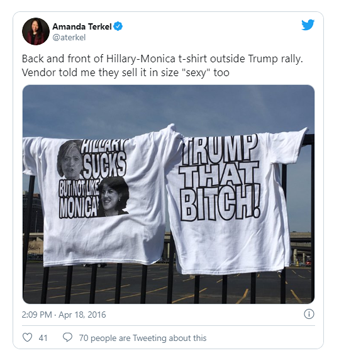
“Rhymes with Rich” Redux: The “Bitch” Metaphor and Campaign 2020
By Karrin Vasby Anderson, Ph.D.
The “B word” is having a moment in U.S. politics.
On July 21, GOP pundits alleged that journalist Kimberly Halkett had called White House Press Secretary Kayleigh McEnany a “lying bitch” during a press briefing. (The video recording proves that she didn’t.) The day before, Rep. Ted Yoho (R-FL) had called Rep. Alexandria Ocasio-Cortez (D-NY) a “fucking bitch” on the steps in front of the U.S. capitol. (A reporter confirmed that he did.)
The second incident remained in the media limelight all week following related speeches delivered by Yoho and Ocasio-Cortez on the floor of the U.S. House of Representatives. After Yoho asserted that the “offensive name calling words” attributed to him were “never spoken to my colleagues” (suggesting that one should be able to mutter “fucking bitch” about anyone with whom you work as long as it is under your breath), Ocasio-Cortez delivered a measured but forceful rejoinder.
I began studying the language used to describe women in politics in 1999, in an article that examined how “bitch” is used as a tool of cultural containment in American politics—a way to signal that a woman has transgressed the boundaries of acceptable behavior, rendering her more threatening and less “likeable” than her male counterparts. As I read journalistic accounts of last week’s incident (Rebecca Traister’s is particularly good), I was pleased to see that conventional wisdom about terms such as “bitch” is finally catching up with what scholars have been saying for years.
Before this incident recedes from the headlines, however, we should reflect on how it prepares us for the final months of the 2020 campaign. Communication scholar Jennifer Mercieca has illustrated why it’s useful to examine logical fallacies and other rhetorical strategies that politicians use. My research reveals how much we can learn by examining metaphors in politics. Metaphors such as “bitch” don’t just affect individual women politicians. They shape our political culture, distorting our understanding of “good” leadership.
Metaphors are more than figures of speech. Eighteenth-century philosopher Giambattista Vico described them as “myths in miniature,” arguing that single words can encapsulate complex cultural narratives. Rhetoric scholar Kenneth Burke explained that metaphors reveal underlying attitudes—motives that may be unacknowledged or even contradicted by the explicit message. The contradiction isn’t usually as dramatic as it was in Yoho’s case, but the point is that if he were actually “very cognizant of [his] language” as a result of “having been married for 45 years with two daughters,” he wouldn’t use the phrase “fucking bitch” in any context. The metaphor betrays his true attitude.
If you want to understand cultural attitudes about gender (or race, sexuality, ability, etc.), assessing metaphors is a good place to start, because they linger in public conversation long after more explicit arguments have been deemed impolitic. It’s unlikely that, in a moment of anger, Yoho would have stood on the Capitol steps and said, “Not only do I disagree with your policy stance, a young Latina like you shouldn’t even be in Congress. You don’t deserve to have as much power as I do.” But he didn’t hesitate to say, “fucking bitch.” Metaphors such as “bitch” are scraps of evidence—symbolic DNA strands which prove that, despite the gains women are making in political and professional spheres, many people still regard their increased presence to be offensive and threatening.
This incident is a good reminder that cultural sanctions against powerful women aren’t just politically incorrect outbursts that we can “okay, boomer” away. They continue to constrain women politicians’ behavior.
Rep. Ocasio-Cortez of New York speaks about the remarks made by Rep. Ted Yoho of Florida on the steps of the Capitol. In her remarks, the congresswoman quoted the expletive and offensive slang term he allegedly called her.
C-SPAN JULY 23, 2020 | CLIP OF HOUSE SESSION, PART 1
A notable feature of Ocasio-Cortez’s speech on the House floor was the measured tone she adopted, one that was quite different from the impassioned and/or irreverent demeanor the media often features. She spoke slowly, deliberately, and evenly as she entered her colleague’s epithet into the congressional record. Nonetheless, she was characterized in some media coverage as “emotional” and “fiery,” and her calm condemnation was cast as an upbraiding (which means “scolding”), a ripping, and a “blistering rebuke.” Those descriptors illustrate how difficult it is for women politicians, particularly Black and Latinx women, to be regarded as rational, logical, and disciplined when doing their jobs. When one in eight Americans believe that women are not as “emotionally suited” as men to serve in elected office, coverage that reinforces that stereotype negatively affects all women politicians.
Ocasio-Cortez also explained that her objection was not just to one man or one set of remarks, but to a broader culture of “impunity” that “accept[s] violence and violent language against women.” While the majority of news outlets published the slur in full, some (such as the Daily Beast and HuffPost) censored “fucking” but not “bitch,” illustrating that a sexual expletive is more offensive to some readers than one that likens a woman to a dog.

Calling a woman a “bitch” when she disagrees with you at work is one way to undermine women’s authority. Another is when men in leadership positions are derided as insufficiently masculine. There’s a long and ignoble history in American politics of candidates feminizing their male opponents on the way to electoral victory. William Henry Harrison won the presidency in 1840, in part by contrasting his manly virtues with Martin Van Buren’s ruffled shirts. In 2004, Democratic nominee John Kerry was cast as French and feminine. During the 2016 campaign, Donald Trump called Republican primary opponent Ted Cruz a “pussy” and Marco Rubio “Little Marco.” Rubio responded by implying that Trump had a small penis.
Recently, the anti-Trump Republican group The Lincoln Project revived the small penis insinuation in its political ad “Shrinking.” They also retweeted a third-party ad that mocked an excuse-filled story Trump told at a rally and ended with the words “Biden President: He’s not a whiny b*tch.” In all of these examples, the more masculine a man is, the better leader he is assumed to be. A “b*tch,” conversely, doesn’t belong in the White House.

As Joe Biden prepares to select a woman running mate, voters should pay close attention to the metaphors that are used by candidates, journalists, and pundits. What stories are being told? What myths are on display? The story that “bitch” tells about candidates is one of the most familiar canards in campaign history. It’s also one of the most destructive. The recent exchange between Yoho and Ocasio-Cortez reminds us that while many voters welcome a woman running mate, a sizable minority might regard a Democratic candidate for U.S. vice president as just another “fucking bitch.”
Photo credit: Screenshot taken from C-SPAN House Session, Part 1, July 23, 2020


